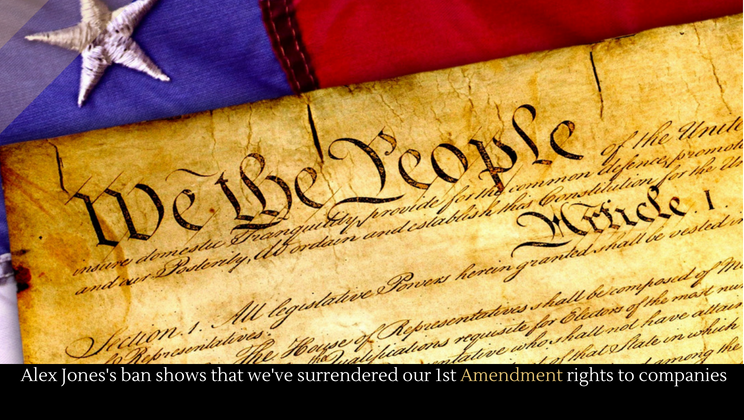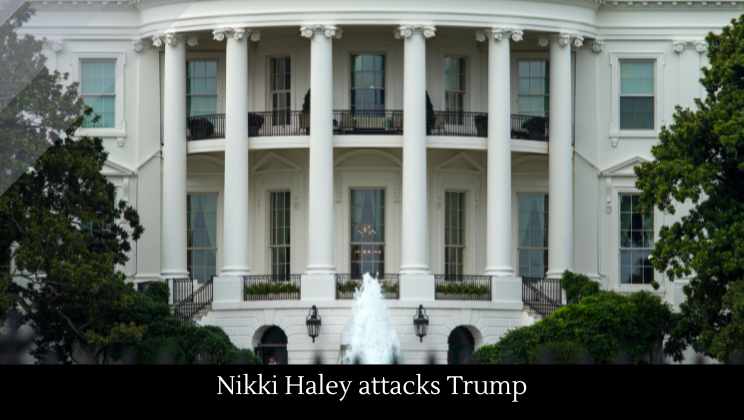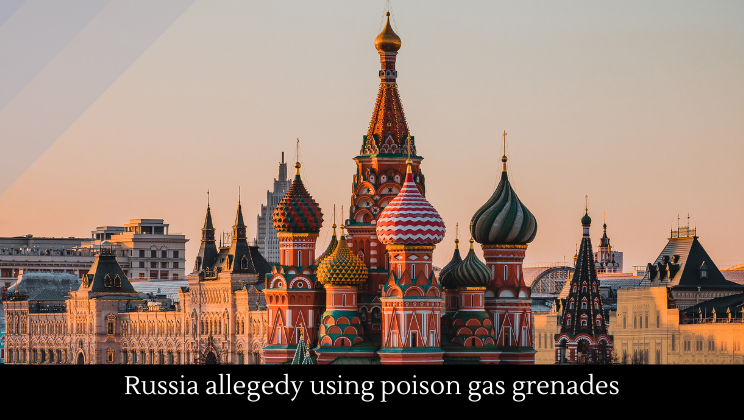Alex Jones’s ban shows that we’ve surrendered our 1st Amendment rights to companies
Posted by Josh Taylor / August 14, 2018
Neal Stephenson’s 1992 novel Snow Crash was a cyberpunk masterpiece. Most people describe the premise of the matrix before the movie The Matrix came out. By Stephenson’s book presaged something else: a world run entirely by corporations. In the novel, characters belong to corporate-owned gated communities that are, effectively, independent nations. They work for immensely powerful corporations that control most aspects of their lives and the world around them. Snow Crash was in some ways the mirror of 1984, except instead of the government, Stephenson predicted that corporations would take tyrannical control of our lives.
The United States Constitution was rooted in the Enlightenment principle that the individual was more valuable than the state and as such the state must not infringe on the individual’s rights. One of the principle individual rights that emerged from this philosophy was the freedom to speak openly in criticism of the state. The First Amendment to the Constitution of the United States therefore dictates that “Congress shall make no law …or abridging the freedom of speech, or of the press…” The Supreme Court of the United States has, using this guidelines, done much to ensure the protection of Americans’ freedom of speech. Alex Jones’s recent ban from Apple, Facebook, Vimeo, and YouTube suggests that the question of free speech has left the realm of the courts and entered the realm of the corporation.
Before moving forward, please read this post about Alex Jones. In it, I argue that we must not resort to polarizing people we disagree with, nor should we mock, belittle, or bully them. I concluded the piece:
Instead of launching into the #secondcivilwar social media fray, then, perhaps it’s better to think through what might be underneath this conspiracy: fear in losing individual rights and freedoms. Conspiracy theorists and doubters might not agree on much else, but they can at least agree on the importance of individual rights. From there, a dialogue might be possible. If we immediately resort to mockery, though, we only further the deepening divide between us.
I want to make it perfectly clear that I do not condone so-called hate speech. I don’t find Alex Jones’s ideas coherent, let alone logical or convincing. But I also understand that Alex Jones has millions of listeners, watchers, and supporters. Millions of people in this country listen to him and think he makes good sense. I think these people deserve respect and should be heard out. If I do not agree with what they believe, I would at least like to know why they believe it. Then, perhaps, we can find common ground. So although I personally do not condone hate speech, we as a country were founded on the right to hate speech.
Indeed, the American Revolution was founded on a blinding, seething hatred of Catholicism. In an eerier parallel to Jones’s obsession with the Globalist Conspiracy, colonial Americans were deeply afraid that an international, Catholic conspiracy aimed to subvert colonial religious practices and the freedom they felt they had as British citizens. Eventually, however, the colonists began to fear that the Catholic conspiracy had spread to the Church of England and then the Crown itself. John Adams himself noted the significance of the fears about the conspiracy in the American Revolution:
If any gentleman supposes this controversy to be nothing to the present purpose, he is grossly mistaken. It spread an universal alarm against the authority of Parliament. It excited a general and just apprehension, that bishops, and dioceses, and churches, and priests, and tithes, were to be imposed on us by Parliament. It was known that neither king, nor ministry, nor archbishops, could appoint bishops in America, without an act of Parliament; and if Parliament could tax us, they could establish the Church of England, with all its creeds, articles, tests, ceremonies, and tithes, and prohibit all other churches, as conventicles and schism shops.
It’s ironic, then, that our nation was founded on attacks against Anglicanism and Catholicism, and then we codified the freedom to make such attacks in the First Amendment (after all, hate speech is not an exception to the First Amendment), but now we’re willingly handing over that freedom to corporations.
What’s even more ironic is that Facebook’s ban of Alex Jones was not a top-down, tyrannical move. Instead, InfoWars was repeatedly reported to Facebook for violating its community standards. Specifically, Facebook stated that they “do not, for example, allow content that could physically or financially endanger people, that intimidates people through hateful language, or that aims to profit by tricking people using Facebook.” This puts Facebook in a unique position of power. Since it has over 2 billion active monthly users around the world, Facebook has now become the world’s largest single arbiter of language. And Facebook users not only gave Facebook that power, but they thrust it upon Facebook.
The Constitution was specifically written to keep governmental power in check. The branches of the government were likewise designed to ensure a homeostasis between the three branches and that the individual’s freedoms would always be protected. What are the goals of Facebook’s “community standards?” What are the checks and balances that keeps Facebook from infringing on your rights to free speech?
Of course, Facebook cannot compel your speech legally. They cannot become an Orwellian Big Brother, sending you to the gulag or reeducation center for your failure to comply with language norms. That would be hard authoritarianism. What we have done by granting social media companies the right to dictate what constitutes acceptable speech in the public sphere is give tacit approval to a soft authoritarianism. We will not be punished by law, but instead by exclusion, mockery, and belittlement.
I don’t like Alex Jones. Even listening to two minutes of his radio show gives me a headache. I find the articles he and his people share through InfoWars to be nonsense. But I think it’s absurd to infringe upon their right to do so. Whatever social media companies and those who report Jones intend, banishing Jones from participating in online conversations––which grow increasingly important every year, as the 2016 election taught us––accomplishes only one thing. It sets a dangerous precedent for the same thing to happen to any group of people that suddenly finds itself on the wrong side of “normal.”












Alex Jones is a freak